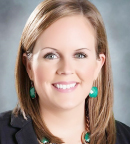
Taylor Bell Duck
I’ve been in excellent physical shape my whole life. Growing up, it was my dream to play Division 1 soccer in college, and I trained hard throughout high school to achieve that goal. My dream came true, in 2005, when I was invited to play soccer at East Carolina University. I was eager to bond with my teammates, attend my classes, and settle into college life.
So, it was especially disappointing when I just couldn’t perform at the same physical level on the soccer field that had made me such an athletic star in high school. As much as I tried, I was unable to pass the 120-yard fitness test, in which athletes are required to run 120 yards in 20 seconds 10 times. I was so concerned that I went to the team physician for a physical, but the tests all came back negative. On paper, I was a healthy 19-year-old; except for getting easily winded on the soccer field, I had no reason to think otherwise.
Finally, concerned that I was physically burned out from all my years of training and not wanting to let down my teammates, I quit the soccer team, and concentrated on my studies and getting involved in campus activities. But by now, new symptoms had started to crop up.
I have always been someone who needs a lot of sleep, so when I started to feel exhausted after a day of attending classes and spending time with my friends in the evenings, I initially chalked it up to not getting enough rest. I didn’t become concerned that something could be seriously wrong until I started having recurring bouts of bronchitis, pneumonia, and upper respiratory infections. But additional physicals and even a chest x-ray failed to turn up a health problem. I later learned that the x-ray did, in fact, show a suspicious mass on my left lung, but it was dismissed by the college health-care team. After all, who would suspect a 19-year-old never-smoker could have lung cancer?
Learning the Truth
IT WASN’T until abdominal pains drove me to the emergency room 2 years later that I finally learned the truth. A computed tomography scan of my upper body showed that although there was no problem with my abdomen, my left lung was partially collapsed, and there was a 4-cm mass nestled in its upper lobe. I was advised to have additional tests. Still, I wasn’t thinking—and no one was saying— that I could have cancer, until I met with a thoracic surgeon, who said as he walked into the examination room, “Ms. Bell, I understand you have lung cancer.”
Looking back, I think I always had an inkling that I could have cancer but dismissed it because I was so young, an athlete, and a never-smoker. There is some family history of lung cancer, but my relatives—a grandmother who was a smoker and a great-grandfather and great-uncle who worked in coal mines—were much older when they were diagnosed with the disease.
In November 2007, I underwent a video-assisted thoracoscopic surgery lobectomy, which removed the mass entirely. The pathology report showed that I had a lung carcinoid; it is a rare cancer—only about 1% to 2% of all lung cancers are carcinoids—and typically unheard of in an adolescent or young adult.1
“When I was first diagnosed with lung cancer, I asked, ‘Why me?’ Now, I ask, ‘Why not me?’ Cancer has shaped me into the strong person I am today.”— Taylor Bell Duck
Tweet this quote
Giving Voice to the Voiceless
AFTER THE diagnosis and treatment, I was sad and angry, struggling to understand what had happened to me. Following the surgery, I went home to recuperate, celebrated the Thanksgiving and Christmas holidays with my family, and returned to college after the break. But getting back into the routine of school was difficult. As much as my friends wanted to support me, they didn’t know what to do, and I didn’t know what I needed from them. I just knew I was emotionally adrift.
It took a while, but I finally began to realize what a gift I had been given. I am one of the lucky ones. I survived lung cancer and feel an obligation to give voice to those who can no longer speak. I especially want to honor the memory of Jill Costello, who, like me, was a Division 1 college athlete when she was diagnosed with lung cancer. She died at age 22.
Ending the Shame of Lung Cancer
TODAY, THROUGH my advocacy work with several organizations, including the Bonnie J. Addario Lung Cancer Foundation, CancerCare, and LUNGevity, among others, I’m fighting to end the stigma of lung cancer and raise awareness that it is not just an older person’s disease. When people learn I had lung cancer, the first question they ask me is, “Were you a smoker?” Breast cancer survivors aren’t quizzed about how they got their disease. Cancer does not discriminate.
The bottom line is that no one deserves cancer, and no one deserves to feel shame because of a cancer diagnosis.
Giving Back
WHEN I was first diagnosed with lung cancer, I asked, “Why me?” Now, I ask, “Why not me?” Cancer has shaped me into the strong person I am today. I recognize how short life can be and appreciate every minute.
I trust that this is where I’m supposed to be, and that I’m doing everything I can to make a difference in the lives of other cancer survivors. It is the most important life mission I could have imagined. ■
Taylor Bell Duck lives in Greenville, North Carolina. She is a physician outreach manager with Vidant Health.
REFERENCE
1. American Cancer Society: Key statistics for lung carcinoid tumor. Available at www.cancer.org/cancer/lung-carcinoid-tumor/about/key-statistics.html. Accessed April 2, 2019.
Editor’s Note: Columns in the Patient’s Corner are based solely on information The ASCO Post received from the survivors interviewed and should be considered anecdotal.

